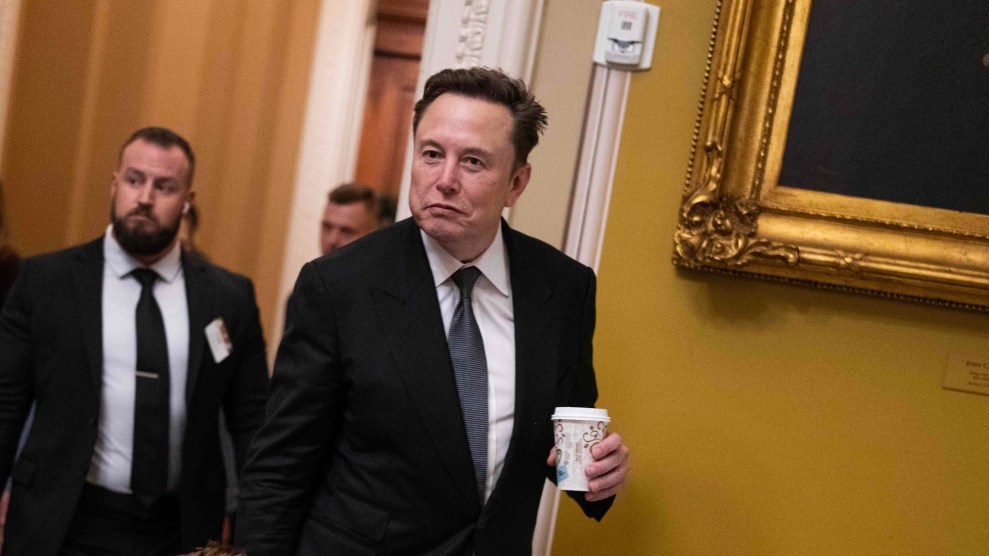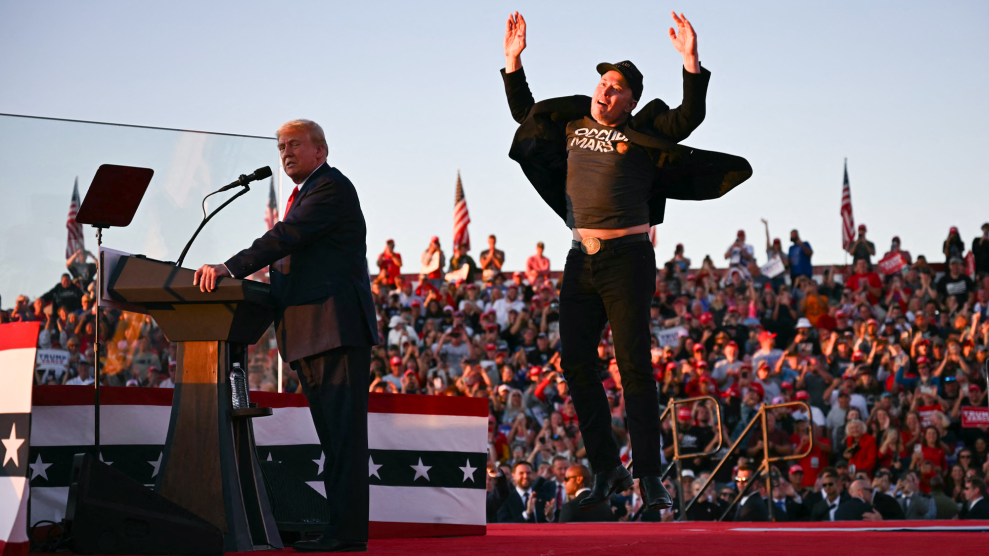
Kevin Lamarque/CNP/Zuma
On the first day of his second term, President Donald Trump created the Department of Government Efficiency he had promised after winning the 2024 election.
Watchdog groups were ready to challenge DOGE from the start under the assumption it would fall under the legal rules governing outside government advisory groups. Indeed, within minutes of Trump’s swearing in, four such lawsuits were filed against it.
“This is an entity that is operating in secrecy.”
But in an apparent attempt to dodge the rules, Trump’s order, instead of creating an outside government advisory group, officially set up DOGE as part of the Executive Office of the President. On paper, its mission was pared down, from massive cuts to government to improving IT efficiency. Did the president and his co-conspirator Elon Musk have a change of heart—or is something else going on?
Since November, DOGE had acted as an off-the-books committee lead by Musk and another MAGA-aligned billionaire, Vivek Ramaswamy. It was already contacting federal agencies and, according to reports, communicating via Signal, an encrypted app with a built in auto-deletion feature that violates federal record-keeping laws.
If DOGE is an outside committee, their work—originally described as drastically reducing the size of the federal workforce and finding up to $2 trillion in spending cuts—must comply with the Federal Advisory Committee Act (FACA), the lawsuits alleged, a 1972 law intended to bring transparency and balance to such committees. One such suit filed by watchdog groups and veterans and teachers organizations called DOGE “a shadow operation,” and argued its “unchecked secrecy, access, and private influence—bought by political loyalty—is anathema to efficient, effective government.”
According to a Washington Post investigation, Ramaswamy and Musk had different ideas about DOGE’s mission—and Musk’s winning perspective was shaped by a desire to skirt transparency requirements. While Ramaswamy perceived of DOGE as an outside government group seeking to slash regulations and shutdown entire agencies, Musk reportedly preferred an operation within the government “using the power of technology and data-mining to achieve DOGE’s aims.”
Further, according to the Post, Musk saw his route as avoiding requirements for transparency: “Musk became increasingly convinced that DOGE should operate as a small team within the government, where it could get access to highly sensitive information and avoid lawsuits attempting to force disclosure of its meetings and minutes.” Musk’s vision won; Ramaswamy left the project. According to the Dispatch, the administration’s decisions not only shielded DOGE from transparency laws, but also regulations governing who they can hire and at what salary.
No matter how DOGE is constructed and sets about its work, the Inauguration Day lawsuits are an opening salvo in a legal battle that is likely to stretch on. “We stand by the proposition that’s in our complaint, that this is an entity that is operating in secrecy,” said Nikhel Sus, deputy chief counsel at Citizens for Responsibility and Ethics in Washington. “Whether they are a private advisory committee or a government agency, they have to comply with certain federal transparency requirements, and there is no indication that they are.”
Take the Freedom of Information Act, which would not apply to an outside advisory committee, but does apply to executive agencies. “They have to pick a lane here. It’s not as if they could be exempt from both FACA and FOIA and all the other government transparency laws,” Sus argues.
It’s possible, Sus acknowledges, that DOGE will fight disclosure under both laws. Trump’s order officially renamed and reconstituted the US Digital Service, a little-known presidential office, as the United States DOGE Service. The USDS began in 2014 as an Obama-era initiative to improve government technology following the disastrous rollout of Healthcare.gov, and has since been housed in the Office of Management and Budget (OMB), a part of the Executive Office of the President that is subject to FOIA.
But the executive order is ambiguous on whether USDS remains part of OMB, or is now more directly under the purview of the Oval Office. If it no longer is in OMB, the courts would have to determine whether in its new form it remains subject to FOIA, after assessing whether it is limited to advising the president or if it is more broadly active across government. Trump’s day one executive order called for DOGE to advise agency heads—a scope that seemingly goes beyond advising the president—but, as we have seen, when it comes to rulings on government records, it really depends on which judge you get.
The president’s order envisions an 18-month timeline for DOGE’s work, and sorting this out in the courts could easily take longer. “The clock will run out on DOGE well before litigation, including all appeals, can be concluded,” warns Bob Bauer. As Bauer, White House counsel under President Barack Obama, told the Dispatch, that’s especially true since Trump administration lawyers are likely to make a “backstop claim that FACA’s limits on how a president gets advice are unconstitutional.”
Such a push to invalidate FACA would be in line with the Republican-appointed Supreme Court majority who are skeptical of any limits on a president’s power, having already rejected repercussions for presidents who break the law in their infamous 2024 immunity decision.
DOGE’s mandate is now muddied by an executive order that conflicts with its original stated goals, leaving uncertainty about what the effort will try to accomplish. But its unstated capabilities are dangerous: The newly constituted USDS is entitled to suck up an enormous amount of data from every part of government. As the executive order lays out, it should have “full and prompt access to all unclassified agency records, software systems, and IT systems.” That data could be used to determine which jobs would be made redundant through technology. Or those decisions could be made after scooping up the emails of all federal employees and finding justifications for dismissal—especially if Trump can eliminate civil service protections. Musk could, as he has done before, publicly target federal employees, but this time with their own communications in hand.
It’s not just the rank and file that could be terrorized by DOGE. While Musk has not been officially named as head of DOGE, in some sort of leadership capacity he could have vast amounts of intelligence on—and sway over—agencies that regulate his own businesses. Based on the executive order, it’s possible he could even have access to cabinet members’ communications, eroding any independence they may have and creating leverage over them.
That makes it worth asking: Is his goal IT modernization, or the power to be had along the way?


















